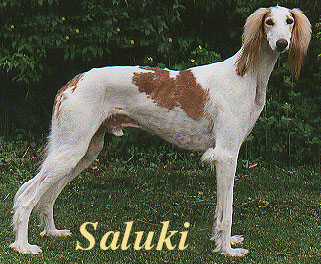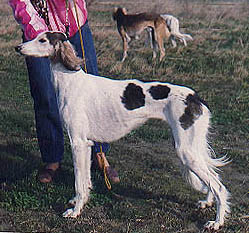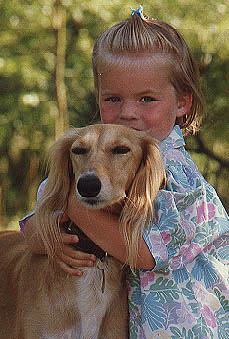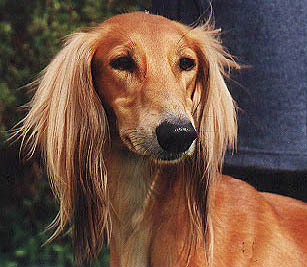 |
|
|
| The Saluki, also called the Persian Greyhound, is one of the oldest existing Sighthound breeds. In the Middle East, where the Saluki has it's origins, ancient wall paintings and other finds reveal that a saluki-like breed of dog was kept as a hunting dog as long ago as the year 6000 BC. Items from graves from around the year 4000 BC suggest that the breed looked then very much as it does today. The breed's long history is fascinating. The Saluki was not only the preferred hunting dog of kings, but also (still is) the nomadic Beduin people's highly esteemed hunting dog. The tradition was, that one never sold a Saluki but instead gave them away as treasured gifts to very special persons or perhaps in exchange for a couple of wives, horses or camels etc.! The Salukis that have made their way to Europe, have also been given away in this manner, especially to the many officers who were stationed out in the east from England and France. In this way the Saluki has traveled to Europe at around the year 1920 where it stayed! Every Beduin group used the type af Saluki, that best suited their own area of the country. The Salukis, that have been imported to Europe and the US, come from many different old original types, and the breed standard is carefully worded to allow for this fact. |

DKCH KBHV88 INTCH FEISAL'S Jaddiih, born 11.4.1987 |
 A little girl called Liv loving one of Danish saluki breeder Birgitte's beautiful show stars! |
One doesn't desire just one single type of Saluki, but tries to preserve many of the original qualities that are also found in literature from a long time ago. But just as with the Beduin peoples, each breeder naturally has personal taste and preferences trying to create their own particular individual "look". Prospective buyers should bare this fact in mind when choosing who their breeder should be. Salukis vary at great deal in their feathering, body shape and or course, their color. Any color or combination of colors is allowed. The height at the shoulder is about 58,5 - 71 cm depending on whether it is a bitch or a dog. The Saluki as a family dog. The Saluki is an oriental Sighthound. Even though the breed has now lived in the West for many generations, it still preserves it's laid back behavior in a way that we are not used to from other breeds of dog. The Saluki is often aloof and reserved with strangers and this has disappointed many a would-be dog friend. Three tail wags is the maximum strangers can expect! But from being just reserved to being over shy and nervous is a long jump. The last is not the desired temperament. "Aloof but distantly friendly" would be correct behavior towards strangers. A Saluki expects that you too show respect and restraint and are not overly demonstrative, otherwise you will see a distant, bored glint in those long-sighted eyes! It maybe takes a little longer to get to know a Saluki, but once you have won its heart, the relationship is richly rewarding on both sides. To its family, the Saluki very faithful and loving. They love attention just like any other dog. They are extremely intelligent and have great personalities. |
| They often keep their playfulness up in ripe old age. They have no specific breed illnesses and they often are very long-lived.
A Saluki's coat is easy to care for. A thorough brush through once a week is fine, unless one wants to fight the small hairs that a Saluki sees to molt the whole year round. In which case you need to brush daily. The Saluki doesn't bark much, but of course is quick to warn if unexpected visitors arrive. Nor is a Saluki completely quiet for many "talk" sweetly and expressively to their owners. A Saluki is not a big tail wagger, but likes to give a discreet "nose-kiss" to show it's devotion and love. Salukis are maybe not exactly what one would think of as a family dog, but they get along just fine with children who are kind, considerate and sensible just as any relationship with any dog breed should be. The Saluki is quiet and elegant indoors and does not smell. But you'd best not be an overexcitable type who shouts a lot, as they can become over nervous as a result. You need plenty of patience. A Saluki is like all the other oriental breeds, very independent and quite sensitive and fine-feeling, so if they get too harsh a treatment, they become over nervous and frightened. The same thing happens if one doesn't train them and get them used to life outside the home and other animals etc. They must have plenty of good positive experiences as young dogs. |

A beautiful portrait of the Danish Saluki male |
| Exercise is important. The Saluki loves to go for long walks in parks, woods or the beach and it's an advantage to live near such areas or be prepared to visit them regularly for the next 10-15 years. They are a strong dog that with the right exercise, are just muscles and bone. The young Saluki exercises itself, it's so full of energy, but the older dog often needs to be cycled and set free to run in enclosed areas like dog parks etc. to keep it in top form. Coming when called CAN sometimes be a problem and one should train right from the start with plenty of rewards and praise. But if you let your Saluki run loose every day from when it is a puppy, (of course only at sensible spots well away from traffic and wild animals etc.) then it will never abuse it's freedom, but will often run in a big circle around you! Train obedience in a way the dog finds fun and to start with you can use a 10 meter long cord attached to the collar and when the dog has learnt to be obedient, gradually shorten the cord until it is only dingling a meter or so. Finally stopping using it all together. It's really only dogs who rarely get to run loose, who might play up and cause trouble when called. Running free is as vital to a Saluki as it's food and sleep! | The hunting instinct. www.youtube.com/watch?v=VUBeSC4L0Tg Or e-mail me at: janetfm@sighthound.net BACK TO CHOOSER or |